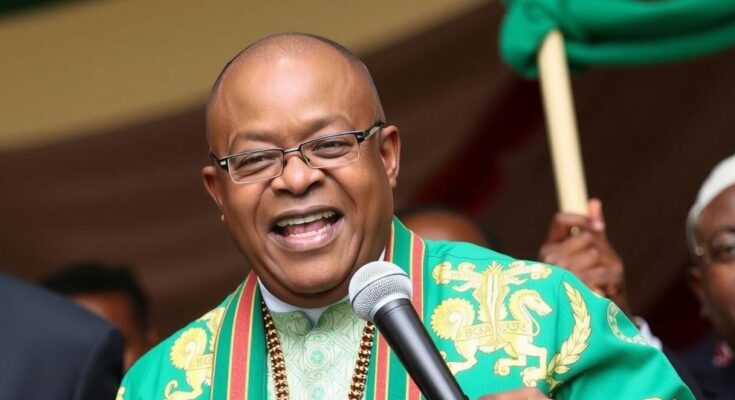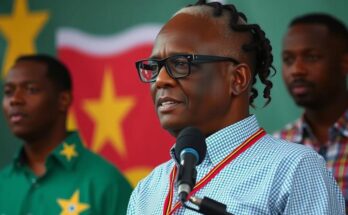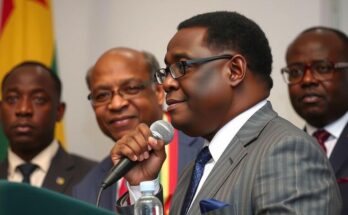John Drahami Mahama has won the Ghanaian presidential election, marking his return to power amid widespread dissatisfaction with the ruling New Patriotic Party due to economic troubles. Vice President Mahamudu Bawumia conceded, acknowledging the public’s desire for change. Mahama’s victory follows previous unsuccessful attempts and comes with support from his party in parliamentary elections. The election was largely centered around the country’s economic issues, highlighting the electorate’s concerns over inflation and debt management.
John Drahami Mahama, Ghana’s former president, has achieved a remarkable comeback by winning the presidential election held on Sunday. His victory follows significant public discontent with the ruling New Patriotic Party (NPP), led by Vice President Mahamudu Bawumia, who conceded defeat after the elections. Voter sentiment indicated a desire for change, primarily driven by frustration over the government’s management of an ongoing economic crisis, characterized by soaring inflation and a recent debt default.
Bawumia’s proclamation of Mahama’s decisive win marks the culmination of Mahama’s third campaign for the presidency, as he had previously been unsuccessful in the elections of 2016 and 2020. “Former president Mahama has won the presidential election decisively,” Bawumia stated at a press conference. Furthermore, Mahama’s National Democratic Congress (NDC) secured a majority in the parliamentary elections, highlighting a shift in public sentiment.
Celebrations erupted in the streets of Accra, where jubilant supporters rallied, holding the party’s colors high in the air. One supporter, trader Leyla Alhassan, exulted, stating, “They said he can’t come back, and he has come. The nation builder is back to build our Ghana for us.” Mahama has yet to publicly address the nation but acknowledged Bawumia’s congratulatory call on social media for his “emphatic victory.”
The election predominantly focused on the economic difficulties Ghana faced, which included a significant currency devaluation and an IMF bailout of $3 billion. An internal assessment by the NDC indicated that Mahama garnered 56.3 percent of the popular vote compared to Bawumia’s 41.3 percent, showcasing the political discontent that has propelled Mahama back to power. Official results from the electoral commission are anticipated by Tuesday.
Ghana has a storied history of democratic governance, with the NPP and NDC alternating power since the re-establishment of multi-party politics in 1992. Bawumia and the NPP campaigned under the slogan “Break the 8” in a bid for a third consecutive term, but they were hindered by the economic turmoil linked to the previous administration. Although economic indicators showed some stabilisation, the electorate’s grievances about the NPP’s handling of the economy were evident, creating an opening for Mahama’s return after his previous tenure, which also faced scrutiny for economic difficulties and power outages during his presidency.
The political landscape in Ghana is characterized by a democratic history with the two major parties, the New Patriotic Party (NPP) and the National Democratic Congress (NDC), alternating power since the return of multi-party democracy in the early 1990s. Economic stability has often been a critical issue for voters, influencing electoral outcomes. The recent election occurred against the backdrop of significant public dissatisfaction with the NPP’s economic policies, particularly amidst an international Monetary Fund (IMF) bailout and high inflation rates. Mahama’s prior presidency from 2012 to 2017 and his subsequent failed attempts to regain the presidency have made his recent victory a noteworthy event in Ghanaian politics.
In conclusion, John Drahami Mahama’s decisive victory in the recent Ghanaian presidential election underscores a significant public demand for change amidst economic distress. The swift concession by Vice President Bawumia reflects the shifting political tide in Ghana, as voters hold the ruling party accountable for the economic challenges faced during its tenure. Mahama’s return to power represents a renewed commitment among Ghanaians towards addressing the pressing economic issues of the country, with expectations for effective governance ahead.
Original Source: www.bryantimes.com



